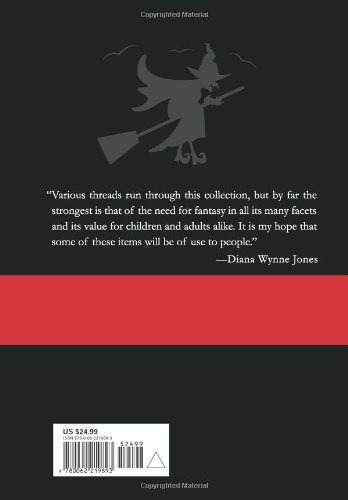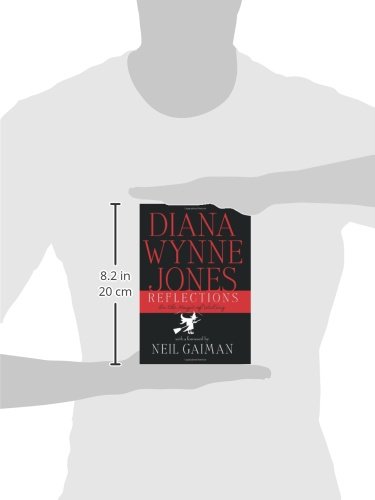Customer Services
Copyright © 2025 Desertcart Holdings Limited




Full description not available
D**R
Thoughtful, amusing and inspiring
I first came to Diana Wynne-Jones through Hayao Miyazaki's movie, "Howl's Moving Castle." Its story was so casually well-imagined that it seemed too "big" for a movie. The movie mined what must have been an exceptionally well-imagined world. Reading "Reflections" confirms the depth and intensity of Ms. Wynne-Jones's imagination. And, like Neil Gaiman's introduction to "Dogsbody," it makes me want to read everything she's ever written.Both the movie and the single fiction by Ms. Wynne-Jones that I have read, "Archer's Goon," intertwine many of the themes she discusses or alludes to in the interviews, occasional speeches, and articles collected in "Reflections":- the abandoned child- the child adrift in a world of adults hapless or bamboozled or ruthlessly cunning (and sometimes all three at once) and at any rate unreliable and unable to sort out their problems by themselves- the child, left to its wits, profiting by them- the rescue of the corrupted adult world by -- and this is important -- not some sugary magical innocence calling forth an easy rescue from the reassuring hand of fate, but by the moral intelligence, sheer pragmatic sense, and willingness of the child to immediately and directly engage the world to solve her problemsWynne-Jones brings the heroic cycle down from its traditionally secure reserve in the adult world to the world of children and teenagers, turning them into active and important players in life rather than mere spectators who should listen to their elders and may be confident that will solve their problems. In so doing, she honors the incredible stress and intensity of childhood and adolescence, when so many things have dire consequences while so few are under one's control. She also honors children themselves. Wynne-Jones believes enormously in the capacity of children, and does not write "down" to them, but rather "up" to their innate best qualities and capacities.In "Reflections," she speaks and writes tellingly of her approach to fiction, which involves and respects children rather than merely lectures them. She speaks out strongly against "problem" books being handed to children with the same problems, feeling that children with serious difficulties in life find fantasy a less stressful way to deal with the same issues. A child immersed in her difficulties on a daily basis, she claims, may find reality-based books which are too on-the-nose to be suffocating.It's an interesting approach. As an adult, I have found books that have acknowledged my own difficulties an enormous comfort. Just knowing there are others who feel the way one does, when others all about do not, can be a sorely-needed validation in a world that is, after all, quite judgmental and prone to regard difference as error and violation, and autonomy as dissent. Nevertheless, an adult has both different needs and more developed emotional resources than does a child. It must be said that Wynne-Jones can write stories that delve deep into the heart of living in a way that both entertains and comforts. She does it so well that I find her arguments persuasive. It is clear they were arrived at and communicated with great conviction and sincerity."Reflections" paints a picture of Diana Wynne-Jones as a writer broadly and deeply educated in her field. Educated at Oxford, married to a professor of medieval literature, and having studied with Tolkien and Lewis, she learned the original languages some of the earliest classics were written in and read them in their original forms. Her path would be a daunting one for an aspiring fantasy writer to follow. Yet the pay-off manifests clearly in Wynne-Jones's ability to bring the old myths and classics, because of their universal themes and canny construction, smoothly into books written for children and young adults that can nevertheless be rewarding to adult readers. As Diana -- so often thinking in a well-rounded way and on more than one level at once -- believed, writing this way ensures that not only will a child be entertained and challenged to think, but whoever may be reading one of her stories to a child isn't in danger of falling asleep out of boredom or coming to dread the task.I learned a lot about the writer's upbringing, artistic development, and theories of fantasy and fiction, highlighting in my kindle edition many incisive ideas I look forward to reading again. Parts of the book do get repetitive, as Wynne-Jones was often called on to address the same topics and had little choice but to draw on the same memories, but overall I loved "Reflections," learned a great deal, was amused, and was inspired to read more, to write more, and to think. In confidence it will do the same for others, I would give it four stars for general readers of writing essays and writer's memoirs and five stars for the subset of those who particularly enjoy fantasy, speculative fiction of all kinds, or children's books, as well as those who have already experienced the delight of reading any of Ms. Wynne-Jones's books.
J**M
A must-have for DWJ fans
This collection of speeches, essays, and bits and bobs from Diana Wynne Jones is wonderful, and you simply must have it if you're a DWJ person. It's arranged chronologically, so that the earliest piece (a reflection on the nature of childhood and imagination) is from 1981, and the last pieces are a final interview from a few weeks before her death in 2011 and posthumous thoughts from her sons.Some of the essays and speeches have been easily available from the official Diana Wynne Jones website, so I was just happy to have them in a more easily readable format because I've already read them twice. "Heroes" and "Inventing the Middle Ages" are both really interesting, for example.The majority of the pieces, though, were not easy to get at all. Many were new to me. There are wonderful essays on narrative, literary fashions, childhood, and fantasy. (I really appreciated her perspective on problem novels; when DWJ first started trying to get published, virtually every story had to be about a child with a Problem, and I remember those books very well.) I was especially happy to see a long essay on the process of writing called "Some Truths About Writing." That piece showed up on the Horn Book website soon after her death, and I thought it was great, but then it disappeared after a few months and I was very sorry I hadn't saved it.I can't list everything I liked, that would be very boring, but I did especially like "Why Don't You Write Real Books?" and "The Halloween Worms" (which is a story about DWJ's well-known tendency to have her books come true at her).It should be understood that since many of these pieces are speeches or essays that were given at various times, but were almost always about writing, there are some things that get repeated several times. DWJ had a very strange childhood and certain things are mentioned fairly often. My favorite parts are about how she and her sisters got yelled at by both Arthur Ransome and Beatrix Potter, who each disliked children (or at least that was the impression she got).Good stuff. Don't miss it!
A**Y
Interesting and inspiring
I love her books, and I was writing a research paper about her, and these essays she wrote are inspiring and incredibly interesting. Would definitely suggest reading it, it gives cool things to think about even if you are not interested in writing or an art field, it made me think of the stories and shows that I was given and shown while growing up.
J**.
Brilliant
DWJ is an underestimated genius, in my opinion. This collection of her writings on writing is a must-read for any writer considering writing fantasy. Jones took a class from Tolkein and CS Lewis at Oxford, which she relates in one particular essay, but that isn't the only reason this is such a good book. Jones is particularly insightful about what kids need and why writing for kids is a particular joy (adult books are too rigidly held to unwritten Rules, for one thing). She is incredibly insightful with regards to certain craft elements that had eluded me before.
T**L
Great for Writers Interested in Kid Lit
This book is terrific. I am so glad that I did some researching. In Neil Gaiman's new book, View from the Cheap Seats, he discusses and includes his thoughts about Diana Wynne Jones, a children's author. I am interested in children's authors, and while I have only read the first two chapters, I find it will be tremendously helpful in understanding why Jones was a best-selling author and how her observations of children translated into her stories. Most importantly, it shows why children love her books!
A**N
It's a kind of magic
She did summon up worlds, a great conjuror. I love slipping into her worlds and follow her impeccable magical logic. Her worlds feel right. Quite the extraordinary woman and wonderful to read her reflections on writing and what brought her writing about.
K**T
... insightful look into the mind of one of the great British fantasy writers
Readable and an insightful look into the mind of one of the great British fantasy writers.
D**Y
Good experience
Excellent - timing of delivery was great and the quality of the merchandise was very good.
O**E
Very worthwhile
So, because of Neil Gaiman I stumbled upon this. It's such a treasure! Diana Wynne Jones explains wonderfully why the brain needs stories full of imagination, what-ifs and problem solving. It's fantasy (not the genre, but the attitude) and myths and fairy tales that do that best. Which is basically where she excels at. D.W.J. overcame a lot of obnoxious obstacles in her career, such as her childhood, mother-in-law and generally all the people that claimed to know what a "good" children's book should be like (except they were dead wrong, of course). Hooray for Diana and her work!
D**L
guter Einblick in Jones Werk
Die versammelten Aufsätze geben einen guten Einblick in die Themen, die für das Werk von D.W.Jones interessant waren. Dabei verknüpft sie private, autobiographische Details mit den Themen, denen sie sich in ihren Büchern gewidmet hat.
Trustpilot
2 weeks ago
1 month ago